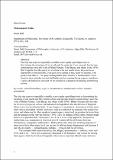Metasemantic ethics
Abstract
The idea that experts (especially scientific experts) play a privileged role in determining the meanings of our words and the contents of our concepts has become commonplace since the work of Hilary Putnam, Tyler Burge, and others in the 1970s. But if experts have the power to determine what our words mean, they can do so responsibly or irresponsibly, from good motivations or bad, justly or unjustly, with good or bad effects. This paper distinguishes three families of metasemantic views based on their attitudes towards bad behaviour by meaning‐fixing experts, and draws a series of distinctions relevant for the normative evaluation of meaning‐determining actions.
Citation
Ball , D 2020 , ' Metasemantic ethics ' , Ratio , vol. Early View . https://doi.org/10.1111/rati.12256
Publication
Ratio
Status
Peer reviewed
ISSN
0034-0006Type
Journal article
Collections
Items in the St Andrews Research Repository are protected by copyright, with all rights reserved, unless otherwise indicated.

